MercoPress. South Atlantic News Agency
Antarctica
-
Monday, January 25th 2021 - 09:40 UTC
Falklands' majestic King penguins at Volunteer Point
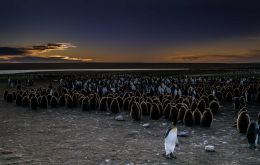
STANLEY, Falkland Islands – The Falkland Islands have become a paradise for wildlife enthusiasts. Decades of good management and conversation policies have helped the different species to advance under this shield. One of those, emblematic, and identified to the image and spirit of the Falklands are penguins. Although not included in the Islands' crest they are virtually everywhere, souvenirs, stamps, badges, pictures, T shirts, and particularly in Volunteer Point, relatively close to Stanley, where the majestic King penguins enjoy a growing rookery, shared with their Gentoo and Magellanic cousins.
-
Monday, January 25th 2021 - 09:07 UTC
Work starts at Antarctica's Rothera Research Station Discovery Building

The next stage of building a scientific support facility in Antarctica has started and to avoid the risk of introducing COVID-19 to the British Antarctic Survey’s (BAS) Rothera Research Station, the construction team spent two weeks in quarantine and had three Covid-19 tests prior to making the 11,000-kilometer voyage by ship.
-
Monday, January 25th 2021 - 08:59 UTC
South Georgia Patagonian toothfish fishery recertified with flying colors

Following its five-yearly Marine Stewardship Council (MSC) assessment, the South Georgia Patagonian toothfish longline fishery has, for the third time, been certified as a sustainable and well-managed fishery, according to the newsletter from the government of South Georgia and the South Sandwich Islands.
-
Monday, January 25th 2021 - 08:51 UTC
Gentoo penguins in South Georgia enjoying an enlarged no-fishing zone
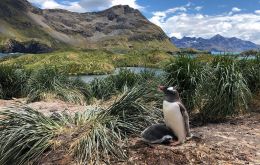
Gentoo penguins are benefiting from a newly enlarged no-fishing zone (known as a No-Take Zone NTZ) around the sub-Antarctic island of South Georgia following British Antarctic Survey (BAS) tracking research commissioned by the RSPB.
-
Monday, January 25th 2021 - 08:15 UTC
Two earthquakes and confusing alert messages, shake Chile
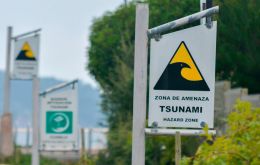
Two earthquakes of 7 and 5.9 degrees of magnitude on the Ritcher scale shook Chile on Saturday, just thirty minutes apart, at Antarctica and in the center of Chile, with Chilean authorities calling to evacuate the coastal areas due to the risk of a tsunami, as a consequence of confusing alert messages.
-
Saturday, January 23rd 2021 - 09:23 UTC
Germany denies change of policy regarding the Falklands dispute
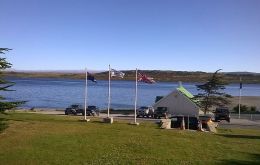
Germany said that its position on the Falkland Islands dispute has not changed, following claims by Argentina that Lufthansa's request for two flights to the Islands, in support of a polar research expedition, implied recognition of the archipelago as Argentine territory.
-
Friday, January 22nd 2021 - 09:43 UTC
Argentina rejoiced with Germany's position on the Falklands/Malvinas dispute

Argentina is rejoicing because Germany's flag carrier Lufthansa formally requested the Civil Aviation National Administration and the Tierra del Fuego, Antarctica and South Atlantic Islands provincial government over flight and landing authorization for two charter flights to the Malvinas Islands from Hamburg.
-
Thursday, January 21st 2021 - 00:48 UTC
Lufthansa to fly nontop to Falklands carrying German scientists

German carrier Lufthansa Wednesday issued a press release confirming plans are underway for a nonstop charter flight between Hamburg and Mount Pleasant in the Falkland Islands for scientific purposes. The airline highlighted the trip will be one of its longest nonstop stretches ever.
-
Tuesday, January 19th 2021 - 09:10 UTC
Falklands Conservation advises on penguins’ 'catastrophic' moulting period
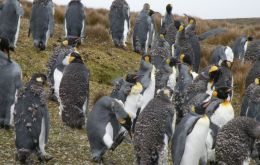
Unlike all other birds, penguins go through what is called a “catastrophic” moult. For the penguin, it is probably as bad as it sounds. Falklands Conservation recalls that every penguin must moult once a year, normally between December to March, by drastically shedding all their feathers and re-growing new feathers in one go – hence the “catastrophic”.
-
Tuesday, January 19th 2021 - 09:07 UTC
Icebreaker HMS Protector is back to sea after £14m revamp
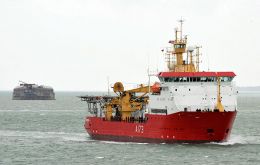
The HMS Protector, the only Royal Navy's ice patrol ship, has returned to sea after a £14m revamp to improve her ability to work in Antarctica. Extra weight was added to the vessel during the work has improved her ice-breaking capability, the Navy said.
